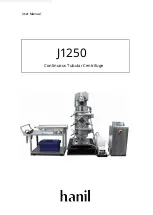
61
Version 1.0 - 2012
Manual XrGi 20G-To
3.4.5. indications of lack of hydraulic equalization
3.4.6. summary
Radiators do not warm up, while other system components are over-supplied ('hydraulic short circuit').
Radiator valves and/or pipes make noises.
Thermostat control is poor.
Heating system is being operated at temperatures that are too high.
The pumps used are too powerful.
The heat source is becoming less efficient.
Flow/return temperatures are unnecessarily high. Especially when using the latest condensing systems or with heat pumps
and systems with auxiliary solar heating, efficiency falls (same applies XRGI)
Non-optimum operation means using considerably more electricity and heat energy.
With all installation options, heat loads must be thermostatically controlled and regulated for their specific flow (hydraulic equa-
lization). Water flows without any significant cooling (short circuits) should be avoided. Only by ensuring that heating water
cools down in the heat loads can long service lives and high heat capacity in the storage tank be ensured. Return temperature
control valves may help in some cases, e.g. with water heaters and convectors.
High return temperatures put stable system operations at risk.
3.5. control StrateGy
The XRGI system monitors how heat and electricity are used over the day and the week. To record electricity consumption, a
reference meter is required which meters the electricity the property requires. The building heat consumption is recorded by
monitoring how the layers are built up and reduced.
This data is saved and analysed, so the XRGI system learns the property's consumption patterns. The saved data and the
current electrical output are used to manage the storage tank and engine output.
If high tariff periods cannot be covered by generating electricity in-house, and there are no major differences in price between
buying and selling electricity, the system can also be operated to meet heating requirements alone, in which case any current
not required is sold and fed into the public grid.
A storage tank is required to smooth out fluctuations in heat consumption and to generate electricity when heat requirements
are low. It should also be able to operate for at least half an hour, even when heat requirements are very low. Using larger or
multiple storage tanks improves operation times and helps separate generating electricity from heat demand.
The XRGI system can handle a large number of operating strategies:
1. Heat-controlled
2. Tariff-oriented
3. Power-controlled
a. Manually
b. Metered
4. Heat-controlled, power-controlled
5. VPP (Virtual Power Plant) – Requires purchasing VPP accessories
6. ESC (External Storage Control)– Requires an external module
Warning! It is essential to check the dynamics and strength of electrical load fluctuations before ins-
talling a reference meter to optimise electricity production. Running major electricity loads, e.g. lifts
for short periods only, while electricity demand is generally low, may make the XRGI's operation time
patterns extremely unfavourable and increase system wear.
Summary of Contents for XRGI 20G-TO
Page 1: ...System components Installation INSTRUCTIONS...
Page 2: ...2 Version 1 0 2012 Manual XRGI 20G TO...
Page 98: ...98 Version 1 0 2012 Manual XRGI 20G TO...
Page 131: ...131 Version 1 0 2012 Manual XRGI 20G TO...
Page 152: ...152 Version 1 0 2012 Manual XRGI 20G TO...
Page 153: ...153 Version 1 0 2012 Manual XRGI 20G TO...
Page 154: ...154 Version 1 0 2012 Manual XRGI 20G TO...
Page 155: ...155 Version 1 0 2012 Manual XRGI 20G TO...
Page 156: ...156 Version 1 0 2012 Manual XRGI 20G TO...
Page 157: ...157 Version 1 0 2012 Manual XRGI 20G TO...
Page 158: ...158 Version 1 0 2012 Manual XRGI 20G TO...
Page 159: ...159 Version 1 0 2012 Manual XRGI 20G TO...
Page 160: ...160 Version 1 0 2012 Manual XRGI 20G TO...
Page 161: ...161 Version 1 0 2012 Manual XRGI 20G TO...
Page 162: ...162 Version 1 0 2012 Manual XRGI 20G TO...
Page 166: ...166 Version 1 0 2012 Manual XRGI 20G TO Notes...
Page 167: ...167 Version 1 0 2012 Manual XRGI 20G TO...
Page 168: ......
















































